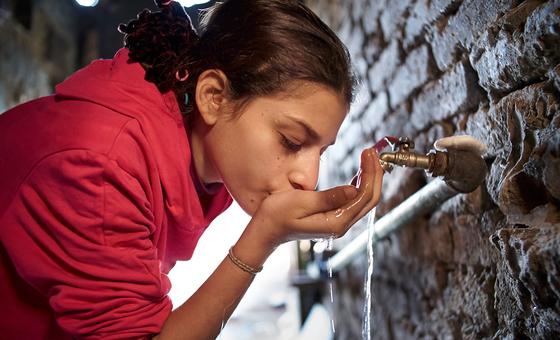Governments must invest more in building safe drinking water systems, both to ensure greater access to this resource and to mitigate the effects of climate change, according to a report published on Monday by the World Health Organization (WHO), UN children’s agency, UNICEF, and the World Bank.
Providing water and sanitation for everyone on the planet is one of the Sustainable Development Goals (SDGs), agreed by all 193 UN Member States in 2015.
The report revealed that although more than two billion people gained access to safe drinking water over the past two decades, a quarter of the world’s population is still being left behind.
A basic human right
Meanwhile, climate change is increasing the frequency and intensity of droughts and floods, affecting water security and disrupting supply.
Rapid urbanization is also making it hard for cities to deliver water to millions living in informal communities and slums.
“Providing greater access to safe drinking water has saved many lives, most of them children. But climate change is eating into those achievements,” said Dr. Maria Neira, Director of WHO’s Department of Environment, Climate Change and Health.
“We have to accelerate our efforts to ensure every person has reliable access to safe drinking water – something that is a human right, not a luxury.”
A critical investment
The report examines the links between water, health and development.
It contains actionable recommendations for governments and partners aimed at increasing funding for safer systems, and strengthening capacities to plan, coordinate, and regulate service provision.
Examples showing how countries are contributing to achieving the SDG target of reaching safely managed drinking water for all by 2030 are also included.
“Investing in water and sanitation is critical to health, economic growth and the environment. Healthier children become healthier adults who then contribute more to the economy and society”, said Saroj Kumar Jha, Director of the World Bank Group’s Water Global Practice.

Keeping children safe
The partners have called for governments and the private sector to dramatically increase political commitment to drinking water, and to quadruple investment.
“No child should be faced with the choice of drinking dirty water – a leading killer of children – or making dangerous journeys to collect water and missing out on school,” said Aidan Cronin, UNICEF Interim Director of Water, Sanitation, and Hygiene (WASH) and Climate, Environment, Energy, and Disaster Risk Reduction (CEED).
“Accessible and reliable safe drinking water is fundamental to ensuring children are healthy, educated, and thriving.”
Action for governments
The report provides comprehensive recommendations for sustainable improvements focused around the areas of governance, financing, capacity development, data and information, as well as innovation.
They include strengthening existing institutions, for example by establishing an effective regulatory environment, supported by legislation and standards for service quality, and ensuring enforcement.
Funding from all sources should be increased, with water service providers improving efficiency and performance, and governments providing a stable and transparent administrative, regulatory and policy environment.
Innovation and experimentation should also be encouraged through supportive government policy and regulation.

